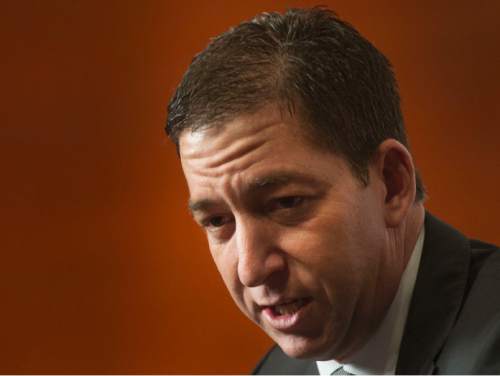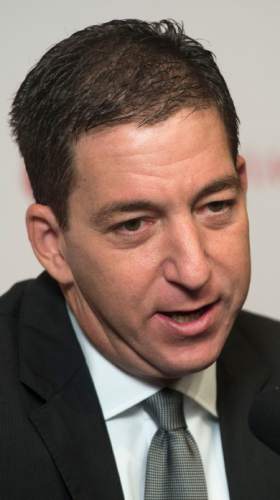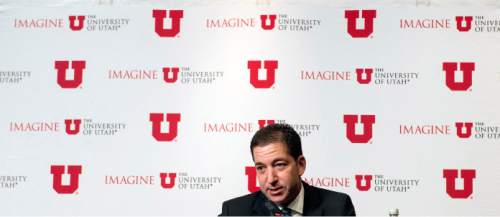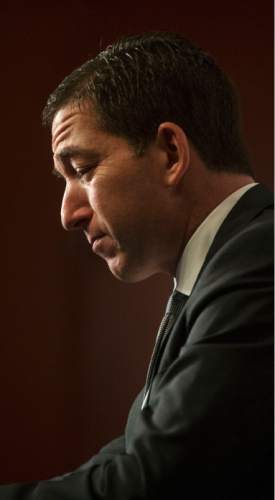This is an archived article that was published on sltrib.com in 2015, and information in the article may be outdated. It is provided only for personal research purposes and may not be reprinted.
Everyone has something to hide, says the man who has been publishing secret National Security Agency documents.
Why else would someone lock the bedroom or bathroom door? Use passwords to protect their social media accounts? Or why would they tell their spouses or psychiatrists things they wouldn't tell others?
"Even if you think that you're the kind of person who does not have things to hide, just living in a world where you think you're being watched and recorded it changes your behavior from being a free individual," journalist and privacy advocate Glenn Greenwald told a crowd Tuesday at the University of Utah.
The 48-year-old, who worked to publish the documents leaked by former government contractor Edward Snowden, spoke for about 40 minutes and took questions for 20 minutes more about privacy and Snowden.
Greenwald said the most shocking thing he's found in the tens of thousands of NSA documents published so far has been the NSA's motto: Collect it all.
"It's not, like, 'Collect a lot of it,' or even, like, 'Collect all the terrorist communications,' " Greenwald said. "It's like saying the goal of the NSA is to eliminate all private communications."
He contended this impedes Americans' freedom: If people are being monitored, they aren't as creative and don't think as freely.
Also, the decisions to collect the data and store it was done with no public discussion. Greenwald said that in free societies, government officials have an expectation of transparency and citizens have an expectation of privacy.
Tyrannical societies have an opposite system.
"I would submit, and I don't think that it's in dispute, that we are far closer to the tyrannical model than we are the free model," Greenwald said.
Greenwald also discussed the NSA's Utah Data Center, located in Bluffdale. He pointed to NSA documents from 2009 and 2010 saying the agency had a problem storing all the data it was collecting.
The Utah Data Center helps solve that problem, Greenwald said.
In a meeting with reporters before his speech, Greenwald said the data center has an "ominous role in the surveillance state."
"The better [the government's] capacity for storage, and the more space they have to do it the longer they can keep the data," Greenwald said.
The data center isn't Utah's only NSA connection. The U. for decades has received grants from the NSA to study mathematics, computing and related fields, and the NSA has visited the U. to recruit linguists.
In his meeting with reporters, Greenwald took a nuanced stance on a university's relationship with the NSA. Not speaking about the U. specifically, Greenwald said a university should not impede research or fail to cooperate with an agency just because the campus administration may not like the agency.
But Greenwald also warned against giving too much campus access to a government agency just because it provides research funding.
"That sort of subverts the concept of universities," he said.
In June 2013, Greenwald met with Snowden. Snowden subsequently gave Greenwald perhaps hundreds of thousands of pages — the exact number has never been disclosed — from the NSA.
The documents have slowly been released through Greenwald's former employer, The Guardian newspaper, and his new enterprise, The Intercept, as well as news outlets across the world. They have revealed not just what the NSA collects but how it has partnered with foreign governments and private companies.
Greenwald said the U.S. government, though it has often warned of publishing the material, has never pointed to someone being hurt by them. He believes his work has had a positive impact.
He pointed to how companies such as Microsoft, Facebook, Google and Apple have reduced their cooperation with the NSA and in some cases begun encrypting more of their products for fear of losing customers.
"What has actually happened in terms of impact is so much better than our best case scenario," Greenwald said.
Greenwald was invited to campus as part of Secrecy Week, where students learn about government surveillance.
U. English professor Matthew Potolsky, who organized the weeklong discussion, said some students have expressed the opinion that they trust the government to protect them.
"And then there are those who are more suspicious," Potolsky said.
The university is paying Greenwald $5,000, according to an invoice The Tribune obtained through a records request.
The New York-born former attorney said he's received support from people on both the left and right of American politics. Some of the Congressmen he's met have told him, he said, they learned more about the NSA programs from his articles than they did sitting on committees with NSA oversight.
Greenwald also told the crowd — which nearly filled the 263-seat auditorium at the Utah Museum of Fine Arts — about an NSA in-house magazine included in the documents. In one issue, an NSA official, apparently speaking freely, told an interviewer that the NSA relationships with foreign governments don't change based on the outcomes of those countries' elections because very few people in those government know of the partnership.
"Think about that kind of secrecy," Greenwald said. "What it really means is you have a government inside of a government."
Twitter: @natecarlisle









